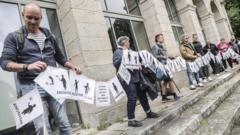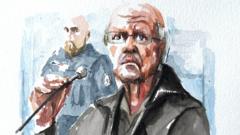Pope Leo XIV has pledged to pursue a path of modernization inspired by his predecessor, Pope Francis, focusing on social justice and the importance of addressing contemporary challenges, particularly those related to artificial intelligence and human dignity.
Pope Leo XIV Champions Modernization and Social Justice in First Address

Pope Leo XIV Champions Modernization and Social Justice in First Address
In his inaugural speech, Pope Leo XIV emphasizes the continuation of Pope Francis’s mission, advocating for social justice, dialogue, and modernization within the Church.
In a significant inaugural address, Pope Leo XIV expressed his commitment to advancing the initiatives set forth by his predecessor, Pope Francis, particularly in fostering a missionary approach within the Roman Catholic Church. Speaking to a gathering of cardinals, Leo outlined a vision centered on collaboration among church leaders and an emphasis on supporting marginalized communities.
Reflecting on the pivotal document written by Pope Francis in 2013, Evangelii Gaudium, Leo reiterated key themes such as the importance of "growth in collegiality," "popular piety," and the church's duty to show "loving care for the least and the rejected." He underscored the need for "courageous and trusting dialogue with the contemporary world," reinforcing a commitment to the modernization the Church embarked on during the 1960s.
In explaining his choice of the name Leo XIV, the new pope referenced his namesake, Pope Leo XIII, who addressed social issues relating to moral questions in his encyclical Rerum Novarum in the late 19th century. Both leaders, Leo noted, confronted significant societal shifts during their respective eras, with Leo XIII responding to the challenges of the Industrial Revolution and Leo XIV identifying the current industrial revolution driven by advancements in artificial intelligence.
This evolution, he pointed out, presents “new challenges for the defense of human dignity, justice, and labor.” Leo XIV expressed hope that the church could provide valuable insights and guidance through its rich social teachings as society navigates these complexities.
In a nod to Pope Francis's legacy, Leo described him as a “humble servant of God,” praising his dedication to a life of service and simplicity. The response from the cardinals present suggested an endorsement of Leo's message of continuity. Cardinal Baltazar Enrique Porras Cardozo from Venezuela said the pope emphasized the ongoing nature of Francis’s papacy, creating engaging dialogue with the cardinals about priest and bishop formation.
As a fresh chapter unfolds under Leo XIV’s leadership, his emphasis on a modern Church dedicated to social justice indicates a continuation of an established direction aimed at bridging tradition with contemporary issues.





















